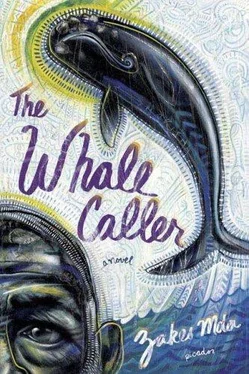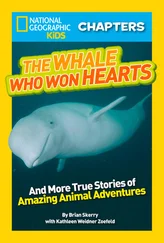On Saluni’s instructions they branch off from the tarred road onto a dirt road. There are thick bushes growing on both sides of the road, filling the air with mentholated scents. They walk on for a few hours on the fine gravel until they reach a green-roofed white house on the shoreline. The Whale Caller knocks but there is no response. He looks through the curtainless windows. All the rooms are empty. Saluni wonders why they should be wasting time when they have such a long way to go. He tries the door. It is not locked. He suggests that they should spend the night there. It is only midday and they are just a few kilometres from town. He hopes that common sense will prevail and she will demand to be guided back to the Wendy house. Stopping at this deserted house will buy him time. He leads her to the veranda that juts into the sea on stilts. They sit on a bench and enjoy the breeze from the sea.
“We could stay here for ever,” he says. “It is such a beautiful place.”
“It must belong to someone,” she says.
“Well, there is no one here. No furniture either. Just this bench on the veranda. Perhaps we should stay here for some days whilst we consider our next move.”
“We don’t need to consider our next move, man. We just walk. We don’t need to get to any particular place either. We just walk. That’s what we’ll do. Walk.”
“Poor house,” says the Whale Caller resignedly. “What a waste!”
“Think, man, think. Why would a house like this be unoccupied when there is homelessness all over the district? There is something wrong with it, man. We wouldn’t stay here even if we didn’t need to walk the road.”
He must think of another trick. Somehow there must be something back in Hermanus that would tempt her to return. He remembers Mr. Yodd. Saluni and Mr. Yodd have become quite cosy recently, even though he was not amused at his failure to make her bleed with his laughter. The Whale Caller suggests that it is a shame to leave Hermanus without saying goodbye to Mr. Yodd.
“He can look after himself,” says Saluni.
“He will miss you though.”
“I have nothing to do with him. He’s not my problem. He will miss you. He has always missed you. And you are free to go back to him.”
“You took him over, Saluni. He is now yours. You bribed him with oblations to the extent that he had no time for me.”
“You can have him back for all I care. I don’t need him. I have my blindness now.”
He curses the blindness under his breath. They sit quietly for a while. He wonders what Sharisha could be doing at that very moment. Perhaps teaching the young one new tricks. Breaching gloriously to the skies, and then splashing down in thunderous abandon. Playing spyhopping tricks in the blue depths. Sooner or later she will miss him. He takes out his kelp horn and blows softly. Not Sharisha’s song. Just meaningless notes as if he is testing the horn.
“You had to bring that accursed horn!” screeches Saluni.
“Just to keep myself busy on the road, Saluni.”
“You might as well throw it away. It is useless without your big fish.”
“I can see it now… you planned it all, Saluni… the blindness … so that you could take me away from Sharisha into the wilderness.”
“I didn’t invite you, did I? I wanted to be on my own. I didn’t ask you to join me on the road. You can go back to your big fish for all I care.”
The next morning they are on the road again, trudging along the shoreline. For some reason Saluni wants them to take the most difficult paths: those that meander over rocky ledges and cross bridgeless streams that hide deep in the gorges. It is as if she is bent on punishing him — and herself in the process. On making him fry in his own guilty sweat. He has to hold her hand all the time lest she tumbles down some cliff and breaks her neck. In the village of Gansbaai they take a rest on a limestone cliff. From here Saluni smells the ocean and the Whale Caller sees it down below extending for kilometres into the horizon. Not even a speckle of a whale. Only a small boat of divers close to the shoreline. And the feverish antics of bottlenose dolphins and hovering gannets as they follow shoals. On the first level of limestone cliffs just above the green shallows Cape fur seals are basking in the sun.
From this promontory known as Danger Point the Whale Caller can see the rocky islet that is famous for the shipwrecks of a bygone era. In the silence that exists between him and the blind woman he resuscitates an old habit: that of ambling in the mists of the past. It is 1852 and he is one of the sailors on HMS Birkenhead. He is a glorious soldier in Her Majesty’s conquering army sailing westwards to the navy base of Stellenbosch in the troopship. Great storms rise and toss HMS Birkenhead against the rocks and wreck it. There are only three lifeboats, which are all sacrificed for the civilian passengers. After helping Saluni to a lifeboat, he joins the other brave soldiers of Her Majesty’s brave army, and stands to attention with a salute and an anthem that appeals to God to save the glorious queen as the ship sinks. He is one of the four hundred and forty-five people, most of them soldiers, who perish in the shipwreck. He dies a happy man, knowing that Saluni has been saved.
“Where are we here?” Saluni asks, bringing him back to the present.
He is amused at the fact that he — a man who dreads killing the fish he catches for his very survival — has just been a soldier. And of all soldiers a soldier of the colonising British!
“We are in Gansbaai,” he says, without betraying the fact that he left her for a while.
“We have been walking for hours and we are still in Hermanus?”
“We are in Gansbaai, not Hermanus.”
“Don’t be daft, man; Gansbaai was merged with Hermanus and Stanford and Kleinmond in the last municipal elections. How come we are still in Hermanus? We left yesterday, man. Are you trying to trick me or something?”
“We move slowly, Saluni, because of your blindness and your insistence that we stay off the good roads.”
After considering the matter for some time she says it does not really matter where they are as long as they keep on walking. In any event they do not have a destination. It should not trouble them at all if they take a hundred years to reach nowhere. The Whale Caller opens a tin of sardines and they eat the fish with biscuits. After the meal she flings the can away, and as he goes to retrieve it he reprimands her for making the shoreline dirty.
“Do we have dustbins here?” she asks.
“We don’t. We’ll take the can with us and throw it into a dustbin when we find one,” says the Whale Caller, picking it up.
“That’s going to be your problem,” she says. “I am not carrying any smelly tins.”
He stumbles across something hidden among the rocks. He moves a boulder and lifts up a sisal sack. From the smell he knows immediately what it is: abalone — or perlemoen, as it is called here. He puts his hand in the sack and it comes out with a purplish brown sea snail whose muscular foot is as broad as his open hand. Never has he seen such big abalone before. The bag is full of perlemoen of varying sizes and colours, ranging from grey to deep purple. He takes the bag to Saluni.
“Look what I found, Saluni,” he says.
“I can’t look, man. I am blind. But whatever it is it stinks like dead fish.”
Before the Whale Caller can tell her what his discovery is a puny man in faded jeans, tattered T-shirt, filthy baseball cap and sneakers that long ago lost their colours, emerges from the fynbos behind them and approaches the Whale Caller cautiously. They size each other up, as if gearing for a fight. Then the man breaks into a smile.
“Give it to me,” he says. “It’s mine.”
Читать дальше












